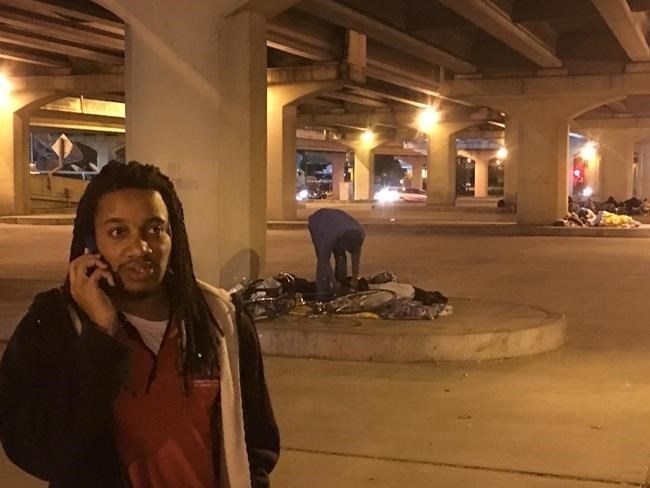
DaVaughn Phillips, left, is seen underneath an overpass on Thursday, Dec. 3, 2015. Phillips seeks out homeless veterans on the streets of New Orleans as part of a national project to end veteran homelessness in the U.S.
Image Credit: THE CANADIAN PRESS/Alexander Panetta
December 12, 2015 - 9:00 PM
NEW ORLEANS - DaVaughn Phillips scours the streets of his city, picking up the broken pieces of yesterday's wars.
He seeks out homeless veterans, then helps them get housing.
So while his country debates the newest Mideast mission and how many soldiers to deploy there, Phillips deals with warriors of the past — from conflicts in Vietnam, Afghanistan and two in Iraq.
He works shifts driving a van between the no-go zones of New Orleans, stopping in shelters, parks, and rat-infested underpasses.
"Are you a veteran?" Phillips asks a man dressed in camouflage. It's a cold night, and he's preparing a sleeping bag in a concrete underpass crawling with rodents.
The man shakes his head. Phillips moves on.
His work is a success story — albeit sprinkled with sad chapters.
Homelessness among veterans is plummeting across the U.S. and it's happening through the work of people like Phillips. He's part of a network that helped make New Orleans the first U.S. city to essentially eradicate it.
The homeless-vet population has declined nearly one-third amid a push by the Obama administration to make it disappear by the end of 2015. The national target won't be reached; there are still tens of thousands. But it's been achieved in a few cities — including New Orleans, then Houston and Las Vegas.
Phillips completed his master's degree while driving the van at night, working for Volunteers of America — one of the community groups drawing from the more than $1 billion a year in federal funding for the issue. Michelle Obama visited to praise the work done in New Orleans.
"It was an amazing, awesome feeling to be first in the country," said Phillips, 28. "But it took lots of work."
The rate of homeless is significantly higher for vets than for the overall U.S. population. In New Orleans, the estimate was that there were 227 such vets when the project started.
The city has now achieved what's called functional zero. That's not quite zero. Many wind up back on the street. However, crews like Phillips' pick them up again, get in touch with local landlords, find them housing and provide a bed and cookware.
More than half of homeless vets grapple with alcohol and drug abuse, according to U.S. federal research. Around half suffer from mental illness. Some of the people working with Phillips are veterans, and have faced similar struggles.
"I like to think of them as a search-and-rescue team," said Melissa Haley, a supervisor at Volunteers for America.
"We know that a veteran who's housed today can easily be homeless tomorrow, for whatever reason. So there's never a true zero — but there is a functional zero."
Phillips estimates about half the vets he deals with saw actual combat. The rest didn't fight — like one man he checked in on last week.
Phillips parked his van, and walked up to a freshly renovated home.
It was neat inside, yet almost empty. The 62-year-old resident was gradually buying furniture with his pension and benefit money, the first purchase being a TV.
The man takes six pills a day to treat his schizophrenia. He'd spent the last few decades in and out of prison. Soon after his latest release, Phillips found him walking toward a shelter.
He was first diagnosed during basic training for Vietnam. He wound up in hospital, and was discharged. The man started naming friends he'd lost in the war, and what had happened: "Shot up in the jungle. Blown up by mines. Agent Orange. Cancer."
Phillips' next stop was a park.
At a food table, homeless lined up for turkey and sweet potatoes. Philllips saw a new face — a veteran. He jotted down the man's name and promised to check on his eligibility for benefits.
Not everyone's eligible.
If you're dishonourably discharged, you don't qualify for some programs. The man wasn't sure of his army status. He'd been caught counterfeiting money and said he'd had incidents with his now-ex-wife. He left the army on bad terms.
The evening's final stop was the Salvation Army.
The man at the front desk is also a pastor — and he was in fervent rhetorical form. Bennie Wilson expressed indignation that national guardsmen don't get equal benefits, unless they've been in actual combat.
He's a former guardsman, so it's personal.
Don't even get him started on the prospect of more war.
Americans want ground troops deployed to the Middle East, according to a new poll. The Obama administration has been sending special-operations teams, and his opponents are pushing for more.
"We're dealing with the effects but not the cause," said Wilson, behind the desk.
"Like (then-secretary-of-state) Colin Powell told (George W.) Bush: 'If you break it, you own it.' This is the result — Humpty Dumpty, broken into little pieces. They came back broken — arms and legs missing. The stuff I've seen the last eight years is mind-boggling."
Until recently, he'd see about five veterans per night. He doesn't see many anymore.
That's the good news.
News from © The Canadian Press, 2015